Westside Observer Newspaper
 May 2016 at www.WestsideObserver.com
May 2016 at www.WestsideObserver.comVoters Beware: You Get What You Vote For
June 2016 Election Recommendations
Article in Press Printer-friendly PDF file
Westside Observer Newspaper
 May 2016 at www.WestsideObserver.com
May 2016 at www.WestsideObserver.com
Voters
Beware: You Get What You Vote For
June 2016
Election Recommendations
by Patrick Monette-Shaw
Several readers asked me to provide recommendations for San Francisco’s June 7, 2016 election. My recommendations are based on reading 87 pages of the five City ballot measure’s legal-language texts, Controller’s statements, Legislative Analyst digests, and other documents, along with media reporting. For what it’s worth, here goes.
 Local
Ballot Measures
Local
Ballot Measures
Prop. “A”: Public Health and Safety Bond Measure
A San Francisco Examiner article on January 31, 2016 indicated $54 million to build a new Animal Care and Control facility initially included in June’s $350 million Public Health and Safety bond was removed in a sudden and unprecedented change of plans. The Examiner reported the $54 million would be used to “modernize homeless shelters and clinics that deal with mental health,” instead. It was unprecedented, in part, because the change was made just two days before the bond measure was to be discussed during a Board of Supervisors Budget and Finance Committee meeting, and in part because typical long-term planning of the timing and composition of bond measures was thrown out the window at the last moment, perhaps along with the baby and the bathwater.
 The plot to remove
the facility was aided and abetted by — get this — the
Board of Supervisors current president, London Breed. The San
Francisco Chronicle reported on January 26:
The plot to remove
the facility was aided and abetted by — get this — the
Board of Supervisors current president, London Breed. The San
Francisco Chronicle reported on January 26:
I’m not buying it!
Unfortunately, the legal text of Prop. “A” states that $20 million will be spent for upgrading homeless shelters, but qualifies it by saying a portion of the $20 million may be to “acquire and construct homeless services sites” — not just homeless shelters themselves. Great: Bond funding for more City office “sites.”
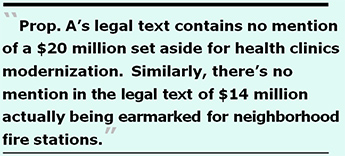 Worse, the legal
text contains no mention of a $20 million set aside for health
clinics modernization. Instead, the clinics modernization are
included in the upgrade of other facilities on SFGH’s campus,
opening the door that if there are cost overruns or “unforeseen
site condition” problems (a recurring issue on bond-funded
projects) on the SFGH campus that $20 million may never be used
for the clinics modernization, since the legal text doesn’t
explicitly set aside the second $20 million, as reported by the
Chronicle.
Worse, the legal
text contains no mention of a $20 million set aside for health
clinics modernization. Instead, the clinics modernization are
included in the upgrade of other facilities on SFGH’s campus,
opening the door that if there are cost overruns or “unforeseen
site condition” problems (a recurring issue on bond-funded
projects) on the SFGH campus that $20 million may never be used
for the clinics modernization, since the legal text doesn’t
explicitly set aside the second $20 million, as reported by the
Chronicle.
Similarly, there’s no mention in the legal text of $14 million actually being earmarked for neighborhood fire stations; instead the fire stations are rolled up into a $58 allocation to construct a Fire Department ambulance and paramedic deployment facility. Should that deployment facility need the full $58 million — whether or not due to cost overruns or “unforeseen site condition” problems — there may be no remaining funds to improve neighborhood fire stations.
Just $272 million of the bond will be used for upgrading of facilities on SFGH’s campus.
Breed is expected to support the Board of Supervisors in issuing by the stroke of its pen $59.5 million as early as May 25 in another debt instrument that does not require voter approval — so-called Certificates of Participation (COPs) — to fund replacing the Animal Care facility (the COPs Ordinance has already been introduced, and is on track to be approved in early June). COPs also require interest payments, so in addition to the $350 million in principal and the projected $254 million in interest for a total of $604 million for the June 7 bond, taxpayers — via the General Fund — will foot the $59.5 million of principal on the COPs plus an estimated $50.5 million in interest, for a total of $110 million for the COP’s.
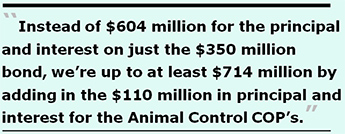 So instead of $604
million for the principal and interest on just the $350 million
bond, we’re up to at least $714 million by adding in the
$110 million in principal and interest for the Animal Control
COP’s.
So instead of $604
million for the principal and interest on just the $350 million
bond, we’re up to at least $714 million by adding in the
$110 million in principal and interest for the Animal Control
COP’s.
No explanation has been provided why costs for the Animal Shelter have surged from $54 million to $59.5 million, in less than three months.
The January 26 Chronicle article also reported Breed told the City’s Capital Planning Committee “Fifty-four million is a lot of money to spend on any facility,” and Breed also criticized the City for “pouring money down the drain” on projects she said are too big and sometimes unnecessary. How’s that for chutzpah?
Perhaps Breed is more comfortable pouring $110 million down the drain for the Animal Control facility — with the stroke of her COP’s pen, no voters required — rather than the $54 million for it that she helped strip from the bond measure.
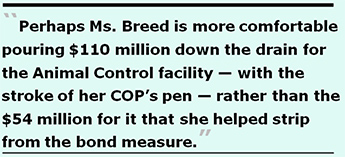 Voters were snookered
on last November’s $310 million housing bond measure: Only
recently has the City finally admitted that fully 20% of that
bond — $62 million — is being set aside for housing
for the homeless, something voters were never
informed about prior to the November 2015 election. [Editor: More
on this bait-and-switch in next month’s Westside Observer.]
Add in the $20 million for homeless shelters in the June bond,
and we’re up to $82 million in bond financing plus interest
for homeless projects.
Voters were snookered
on last November’s $310 million housing bond measure: Only
recently has the City finally admitted that fully 20% of that
bond — $62 million — is being set aside for housing
for the homeless, something voters were never
informed about prior to the November 2015 election. [Editor: More
on this bait-and-switch in next month’s Westside Observer.]
Add in the $20 million for homeless shelters in the June bond,
and we’re up to $82 million in bond financing plus interest
for homeless projects.
In addition to November’s bond, the City recently introduced a separate COP for an affordable housing Rental Assistance Demonstration (RAD) project that features $83.4 million in principal plus a staggering $129.8 million in interest —155.6% in interest on the principal — for a total of an additional $213.2 million in COP debt service without voter approval. It is not yet known how much of the Rental Assistance COP’s will also be used to house the homeless.
Between November’s $310 million Affordable Housing bond measure and June’s $350 million Public Health and Safety bond measure, taxpayers are footing $1.13 billion in principal and interest for two bonds. Add the two COP’s nearing approval — the housing RAD project and the Animal Care and Control project — that total another $323.3 million, and we’re up to a combined $1.45 billion in principal and interest debt service in a short seven-month period for four projects, not all of which may be capital improvement projects.
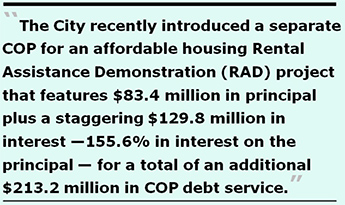 I’m tired of
being snookered by City Hall. I’m voting “No” on
Prop. “A.” You should, too.
I’m tired of
being snookered by City Hall. I’m voting “No” on
Prop. “A.” You should, too.
Prop. “B”: Park, Recreation and Open Space Fund (City Charter Amendment)
Prop. “B” is a bald attempt to increase the Rec and Park Department’s annual budget by $30 million over a 10-year period above its current $67 million annual budget, and also extend the Open Space fund for an additional 15 years. There’s no specificity on what the Open Space set-aside and baseline budget increases will, or shall, be used for.
It’s another slush fund for the Rec and Park Department to spend on whatever they want, with no ability for San Franciscans to weigh in on the use of the increased funds. Everyone wants the best for our parks, and wants resolution of the $1.6 billion in deferred parks maintenance. But there’s no guarantee Prop “B” will solve the deferred maintenance backlog or fix spending of Rec and Park’s annual baseline General Fund allocation. No new funds to this Open Space Fund or to Rec and Park’s annual budget, until we’re told beforehand how the additional funds will be spent!
Prop. “B” will extend the Open Space Fund set-aside and baseline appropriation by 15 years from the current 30-year term to 45 years, and expire at the end of fiscal year 2045–2046. Prop. “B” appears to eliminate the Board of Supervisors power to adopt, reject, or modify any Strategic and Capital Expenditure Plans adopted by the Rec and Parks Department, including its Open Space Fund.
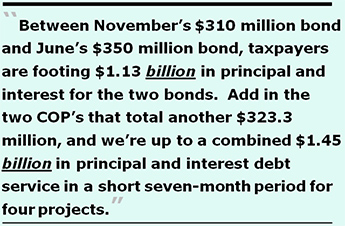 Importantly, the
City Controller’s statement assessing Prop “B”
notes the Open Space set-aside is not
in compliance with a voter-adopted City policy regarding “set
asides” that reduce General Fund dollars that could otherwise
be allocated to other priorities.
Importantly, the
City Controller’s statement assessing Prop “B”
notes the Open Space set-aside is not
in compliance with a voter-adopted City policy regarding “set
asides” that reduce General Fund dollars that could otherwise
be allocated to other priorities.
The conservative San Francisco Chronicle carried an editorial on April 21 titled “Good cause, bad policy,” in which it recommended voting “No” on Prop. “B.”
Join the San Francisco Coalition of Neighborhoods, and Open Space Fund community watchdog extraordinaire Nancy Wuerfel, and I in opposing Prop. “B.” Vote No!
Prop. “C”: Affordable Housing Requirements (City Charter Amendment)
In November 2012, voters passed the then-Prop. “C” to create the Housing Trust Fund (HTF) to increase funding for housing development. Over the 30-year life of the HTF, the City’s General Fund will contribute $1.3 billion to $1.5 billion to the HTF, not all of which is dedicated to “affordable housing.”
But the 2012 HTF ballot measure contained a “poison pill” — more politely, a “drafting error” — that voters may not have been clearly aware of. The poison pill was a gift to real estate speculators and developers, and involved reducing the on-site affordable “inclusionary” housing requirement by 20% — from 15% to 12% — a change that was incorporated into the City Charter, so that developers and speculators could increase their profits. The 2012 measure prohibited the City from adopting any new land use legislation or administrative regulations to require increasing the amount of “inclusionary housing,” and was enshrined in the City Charter.
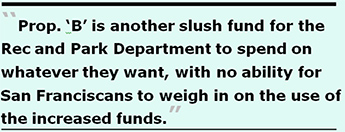 The first Housing
Balance Report dated July 7, 2015 (required following legislation
introduced by Supervisor Jane Kim that was passed) showed the
ten-year Citywide Cumulative Housing Balance — the ratio
of “affordable” to “market-rate” housing built
— was just 21%; the second Report, dated September 4, 2015
showed the Cumulative Balance had dropped to 15%, and the new
third Report shows it is now 18%, although Peter Cohen and Fernando
Marti, Co-Directors of the Council on Community Housing Organizations,
reported in their April 7 Op-Ed in the San Francisco Examiner
that the net new affordable housing is down to 13%.
The first Housing
Balance Report dated July 7, 2015 (required following legislation
introduced by Supervisor Jane Kim that was passed) showed the
ten-year Citywide Cumulative Housing Balance — the ratio
of “affordable” to “market-rate” housing built
— was just 21%; the second Report, dated September 4, 2015
showed the Cumulative Balance had dropped to 15%, and the new
third Report shows it is now 18%, although Peter Cohen and Fernando
Marti, Co-Directors of the Council on Community Housing Organizations,
reported in their April 7 Op-Ed in the San Francisco Examiner
that the net new affordable housing is down to 13%.
The first two Housing Balance reports in July and September 2015 reported the Projected Housing Balance — projects in the development pipeline — was 11%, and the third report in March 2016 reported the Projected Balance is now 15%.
Between the second and third Housing Balance reports, the number of new housing units produced for moderate income households saw a 28.4% net decline, from 1,550 in September 2015 to just 1,120 affordable units in the March 2016.
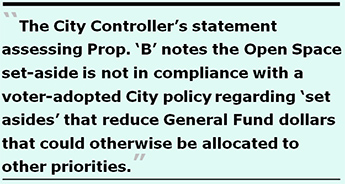 Planning Code §303(q)(6)
requires that if the cumulative housing balance falls below 30%
in any given quarter, the City shall
consider contributing additional funds to the Mayor’s Office
of Housing and Community Development to fund development of new
affordable units, in order to maintain the cumulative housing
balance at or above the 30% threshold.
Planning Code §303(q)(6)
requires that if the cumulative housing balance falls below 30%
in any given quarter, the City shall
consider contributing additional funds to the Mayor’s Office
of Housing and Community Development to fund development of new
affordable units, in order to maintain the cumulative housing
balance at or above the 30% threshold.
The new Prop “C” in June 2016 would remove the City Charter prohibition, will return the inclusionary housing percentage back to 15%, and will allow the Board of Supervisors to adjust the inclusionary housing percentages by Ordinance in the future, rather than having to ask voters to weigh in on the issue again.
Vote Yes!
Prop. “D”: Office of Citen Complaints (Initiative Ordinance)
Prop. “D” simply requires the Office of Citizen Complaints (OCC) to investigate all incidents in the City in which a police officer fires a gun killing or injuring someone, even if nobody files a complaint, and requires Police Department officers and employees to cooperate with OCC investigations of such shootings.
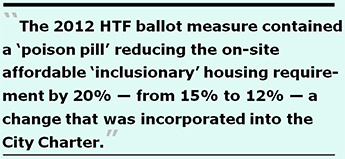 This is a common-sense
reform that should be supported, even if it might require the
OCC to hire additional investigators to handle any increase in
investigations.
This is a common-sense
reform that should be supported, even if it might require the
OCC to hire additional investigators to handle any increase in
investigations.
As I reported in “Mayor’s Hiring Binge vs. Retiree Pensions” in the Westside Observer last March, during the four-and-a-half short years of Mayor Ed Lee’s tenure, he added 5,139 full- and part-time employees to the City’s payroll at an increased cost of $567.1 million — slightly over a half-billion dollars. And that’s not including fringe benefits and increased pension costs for the additional 5,139 City employees.
Prop. “D’s” City Controller voter guide statement notes that the salary and fringe benefits for hiring one OCC investigator is a paltry $140,000, and the OCC’s budget for Fiscal Year 2015–2016 was a mere $5 million. The Controller rightly notes that should Proposition “D” be passed by voters, it would have a “minimal effect” on the cost of City government.
For a ballot measure with minimal cost and many large benefits of greater Police Department oversight, it’s well worth it. Please join me in voting “Yes.”
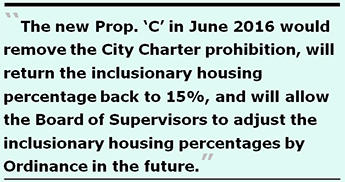 Prop.
“E”: Paid Sick Leave (Initiative Ordinance)
Prop.
“E”: Paid Sick Leave (Initiative Ordinance)
No recommendation.
District Measure “AA”: San Francisco Bay Clean Water, Pollution Prevention, and Habitat Restoration
This measure will levy a parcel tax of $12 annually in each of the next 20 years for each parcel in the nine-county Bay Area. Over the life of the measure, each parcel owner would contribute a total of $240 towards clean water, pollution prevention, and habitat restoration in the San Francisco Bay Area. The measure says it will raise $25 million annually, and presumably over the 20-year period, will generate a half-billion dollars for a variety of projects.
For the sake of our environment, $12 a year — $1 per month — seems like a bargain to me for owners of these parcel’s, and a small price to pay. Even though I rent, I’d gladly give my landlord the $12 a year. Vote “Yes.”
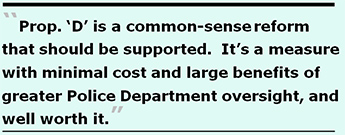 California
State Senator
California
State Senator
The State Senator contest between two sitting members of the Board of Supervisors — Jane Kim and Scott Wiener — to replace termed-out State Senator Mark Leno should be a no-brainer: Vote for Jane Kim.
Ultra-moderate Scott Wiener has, among other legislative issues, been a complete disaster on housing issues and re-zoning of large swaths of San Francisco. Wiener’s housing philosophy appears to be “build lots of market rate housing at all costs, and let ’affordable housing’ trickle down to the masses of citizens.” Given the glut of market-rate housing, and the paucity of affordable housing built in the past 10 years in San Francisco, it’s painfully obvious Wiener’s trickle-down theory isn’t trickling down quite so well.
 Jane Kim, on the
other hand, has a very strong record on a whole host of legislative
issues too long to wade into this article, including taking the
lead on sponsoring legislation to require San Francisco’s
Planning Department to submit a Housing Balance Report twice annually
to the Board of Supervisors.
Jane Kim, on the
other hand, has a very strong record on a whole host of legislative
issues too long to wade into this article, including taking the
lead on sponsoring legislation to require San Francisco’s
Planning Department to submit a Housing Balance Report twice annually
to the Board of Supervisors.
The most recent Housing Balance Report issued on March 31 shows that although 22,531 units were actually built between first quarter 2006 and fourth quarter 2015, and another 11,140 are considered either “entitled” to be built or have received permits (but have not actually been built, some of which may potentially never be built) for a total of 33,671 potential new units, only 5,934 of the units are considered to be “affordable” (although 10,052 affordable units were built, a total of 4,118 units were removed from the affordable housing stock, including to condo conversions, demolition, Ellis Act evictions, and owner move-in evictions). The end result is that only 17.6% — 5,934 — of the units built during the past decade, or are in the construction pipeline, are considered to be “affordable.”
 That’s hardly
“trickle-down” in San Francisco, which has added 140,000
new jobs and 50,000 new residents just since 2009. Kim is to be
commended for trying to identify the problem of trickle-down housing
economics that aren’t working.
That’s hardly
“trickle-down” in San Francisco, which has added 140,000
new jobs and 50,000 new residents just since 2009. Kim is to be
commended for trying to identify the problem of trickle-down housing
economics that aren’t working.
At the Board of Supervisors Land Use Committee hearing on April 18, Wiener wrongly accused Supervisor Kim and Supervisor Peskin in a public hearing of having engaged in a “backroom deal,” regarding a mere 200 units involving “grandfathering” (a.k.a. “grandparenting”) of inclusionary affordable housing units for projects in the pipeline. Wiener’s body language during that hearing illustrated just how petulant he becomes at times, a trait not worthy of anybody seeking election to the State Senate.
Wiener’s tizzy about grandfathering just 200 units being unfair to his real estate and developer campaign contributors was comical, at best.
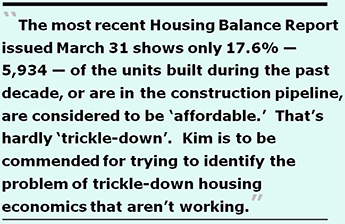 Electing Kim to the
Senate would provide a needed balance to San Francisco Assemblyman
David Chiu in the State Assembly. Conversely, Wiener in the Senate
and Chiu in the Assembly is a recipe for disaster for a really
long time. Vote for Kim!
Electing Kim to the
Senate would provide a needed balance to San Francisco Assemblyman
David Chiu in the State Assembly. Conversely, Wiener in the Senate
and Chiu in the Assembly is a recipe for disaster for a really
long time. Vote for Kim!
DCCC Recommendations
The race for 24 seats on San Francisco’s Democratic County Central Committee (DCCC) is very intense. I recommend most of the 21 candidates endorsed by the San Francisco Bay Guardian, which released a special web page devoted to its June 2016 election recommendations.
However, since State Senator John Burton declared he is running for the DCCC in the 17th Assembly District after the Guardian published its endorsements, if you feel strongly about electing Burton to the DCCC you’ll need to decide which of the other 14 candidates the Guardian recommended to eliminate.
The list below shows I recommend voting for Senator Burton, and not voting for Bevan Dufty. In my book, Mr. Dufty’s role in getting Ed Lee appointed as the “interim” Mayor was, and is, unforgiveable.
When the Board of Supervisors voted for an Interim Mayor for a one-year term to replace Mayor Gavin Newsom, Dufty initially cast no votes for anybody during the first two rounds of voting. Dufty then asked for a recess, and during the recess, Dufty suddenly met with Gavin Newsom in the Mayor’s suite in City Hall Room 200, more than likely making a deal with The Gavin for a City Hall job when Dufty was termed out. When the Board resumed from recess, everyone was shocked when Dufty suddenly backed appointing Ed Lee as interim mayor.
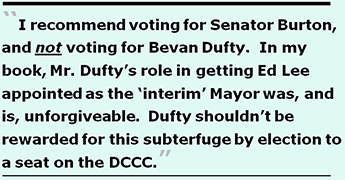 Dufty has often been
characterized as “flip-flopping” his votes as a former
Supervisor, when not characterized as being “fickle.”
Dufty is widely seen as a politician at their worst, or alternatively
as being “Machiavellian” — using clever lies and
tricks in order to get or achieve something, or someone marked
by conduct involving cunning, duplicity, or bad faith.
Dufty has often been
characterized as “flip-flopping” his votes as a former
Supervisor, when not characterized as being “fickle.”
Dufty is widely seen as a politician at their worst, or alternatively
as being “Machiavellian” — using clever lies and
tricks in order to get or achieve something, or someone marked
by conduct involving cunning, duplicity, or bad faith.
In my book, Dufty’s betrayal led directly to Mayor Lee’s failed housing and economic policies during Lee’s almost five-year tenure that has driven too many San Franciscans out-of-county. Dufty shouldn’t be rewarded for this subterfuge by election to a seat on the DCCC.
17th Assembly District (East Side)
There are 14 seats up for the DCCC on the East Side. Vote for these candidates:
Alysabeth Alexander, Tom Ammiano, John Burton (instead of Dufty), David Campos, Petra DeJesus, Jon Golinger, Prathima Gupta, Frances Hsieh, Jane Kim, Rafael Mandelman, Sophie Maxwell, Aaron Peskin, Leroy Wade Woods, and Cindy Wu.
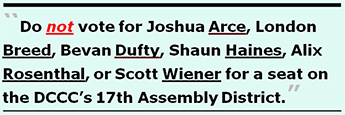 Do not vote for Joshua Arce,
London Breed, Bevan Dufty, Shaun Haines,
Alix Rosenthal, or Scott Wiener for a seat on the
DCCC’s 17th Assembly District. They’re all bad apples,
for various reasons.
Do not vote for Joshua Arce,
London Breed, Bevan Dufty, Shaun Haines,
Alix Rosenthal, or Scott Wiener for a seat on the
DCCC’s 17th Assembly District. They’re all bad apples,
for various reasons.
19th Assembly District (West Side)
There are 10 seats for the DCCC on the West Side. Only seven met the Bay Guardian’s endorsement criteria, who I also recommend. Vote for:
Brigitte Davila, Sandra Lee Fewer, Hene Kelly, Leah LaCroix, Eric Mar, Myrna Melgar, and Norman Yee.
 Do not vote for Joel Engardio,
Mark Farrell, or Mary Jung for a seat on the DCCC’s
19th Assembly District. They’re also bad apples, also for
various reasons.
Do not vote for Joel Engardio,
Mark Farrell, or Mary Jung for a seat on the DCCC’s
19th Assembly District. They’re also bad apples, also for
various reasons.
Superior Court Judge
There are three candidates running for San Francisco Superior Court Judge: Sigrid Irias, Victor Hwang, and Paul Henderson.
 Henderson has claimed
it’s important that an African American who is gay be elected
to the bench. Hwang, an Asian candidate, is clearly more qualified
than Henderson.
Henderson has claimed
it’s important that an African American who is gay be elected
to the bench. Hwang, an Asian candidate, is clearly more qualified
than Henderson.
The ultra “moderate” Alice B. Toklas Democratic Club has endorsed Henderson.
Mr. Henderson is currently the Mayor’s Deputy Chief of Staff for Public Safety. Imagine, for example, a lawsuit being filed in Superior Court against the City, and the case is assigned to a “Judge” Henderson. I’m not at all convinced Paul would maintain any semblance of “independence” in judging the merits of such a lawsuit, and I’m very concerned he would, by default, support the City in such a lawsuit, rather than remaining impartial.
 As an emissary from
the Mayor’s Office at various City Hall events, Henderson
makes a great emcee. I’m not convinced having emcee skills
is the best qualification to become a judge.
As an emissary from
the Mayor’s Office at various City Hall events, Henderson
makes a great emcee. I’m not convinced having emcee skills
is the best qualification to become a judge.
Another example: Were a lawsuit to be filed against the City in Superior Court by a City employee wrongfully terminated for any number of prohibited personnel practices — discrimination based on age, gender, race, or other prohibited actions — I don’t have much faith in a Judge Henderson remaining impartial.
As another example, were a lawsuit filed in Superior Court against the City involving violations of San Francisco’s open government Sunshine Ordinance, violations of the Brown Act, or violations California’s Public Records Act, I have no optimism a Judge Henderson would remain impartial.
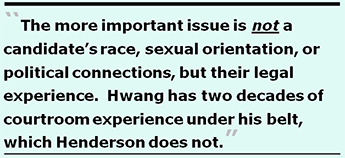 Reportedly, two years
ago Henderson sought to be appointed to a judicial vacancy by
Governor Brown. But reportedly, Henderson hasn’t heard from
the governor’s office. If Governor Moonbeam hasn’t been
keen on appointing Henderson to a vacancy, I’m concerned.
Supervisor David Campos, a gay man who attended Harvard Law School,
has endorsed Hwang, as have other elected City officials.
Reportedly, two years
ago Henderson sought to be appointed to a judicial vacancy by
Governor Brown. But reportedly, Henderson hasn’t heard from
the governor’s office. If Governor Moonbeam hasn’t been
keen on appointing Henderson to a vacancy, I’m concerned.
Supervisor David Campos, a gay man who attended Harvard Law School,
has endorsed Hwang, as have other elected City officials.
If none of the three candidates win 50% + 1 in the June primary, the top two candidates will be forced into a run-off election in November. That’s why it’s really important to not vote for Henderson, so further debates on the qualifications to become a Superior Court judge can continue.
From my perspective, the more important issue is not a candidate’s race, sexual orientation, or political connections, but their legal experience. Hwang has two decades of courtroom experience under his belt, which Henderson does not. Hwang clearly is the most qualified candidate; vote for him. Hwang’s campaign motto is “Experience Matters.” It should, and does!
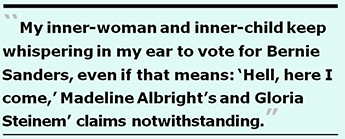 Democratic Presidential Primary
Democratic Presidential Primary
This should be a no-brainer: Despite former Secretary of State Madeleine Albright’s and feminist Gloria Steinem’s recent claims there will be a special place in hell for women (and Democrats) who don’t vote for Hillary, I’m going out on a limb, since my inner-woman and inner-child keep whispering in my ear to vote for Bernie Sanders, even if that means: “Hell, here I come,” Madeleine Albright’s and Gloria Steinem’s ridiculous claims notwithstanding.
Hillary Clinton’s “negatives” are way too high, and may well turn out a deciding factor in handing the Republican Party the Presidency for four to eight years, or longer, if Clinton is chosen the Democratic nominee.
Hillary’s, and her husband Bill’s, legacy include disasters such as the military’s “Don’t Ask Don’t Tell” policy (subsequently abandoned by the military); the horrible DOMA (Defense of Marriage Act), in which the Clinton’s failed to support legal marriage of gays and lesbians (eventually struck down by the U.S. Supreme Court); NAFTA (the North America Free Trade Act), which ended up gutting the U.S. job market and outsourcing of untold millions of jobs to other countries; and most egregiously, the Clinton’s support for eliminating Glass-Steagall, which allowed the deregulation of Wall Street that lead directly to the great economic meltdown of 2008–2009.
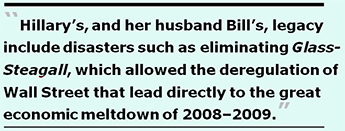 Glass-Steagall
refers to the entire U.S. Banking Act of 1933, which incorporated
the Glass-Steagall Act of 1932. It was enacted as an emergency
response to the failure of nearly 5,000 banks during the Great
Depression. The Banking Act of 1935 clarified the 1933
legislation. Glass-Steagall was intended to separate commercial
and investment banking, and prohibited commercial banks from engaging
in the investment business. It did so for almost seven decades.
Glass-Steagall
refers to the entire U.S. Banking Act of 1933, which incorporated
the Glass-Steagall Act of 1932. It was enacted as an emergency
response to the failure of nearly 5,000 banks during the Great
Depression. The Banking Act of 1935 clarified the 1933
legislation. Glass-Steagall was intended to separate commercial
and investment banking, and prohibited commercial banks from engaging
in the investment business. It did so for almost seven decades.
But after 66 years, both of the Clinton’s thought they knew best when Glass-Steagall was repealed in 1999 by the Gramm-Leach-Bliley Act (GLBA) and signed into law by then-President Bill Clinton, one of Bill’s stupidest acts while president. It took just nine years after Clinton signed GLBA into law for the great 2008 financial meltdown to occur.
Many media journalists believe, and have documented, the 2009 financial crisis might not have happened at all but for the 1999 repeal of Glass-Steagall. U.S. News and World Report carried an article on August 27, 2012 written by — get this — New York City hedge fund manager James Richards, author of a book titled “Currency Wars: The Making of the Next Global Crisis.”
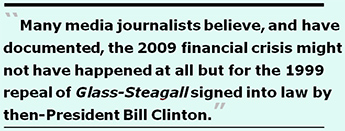 Richards noted that
the oldest propaganda technique is to repeat a lie emphatically
and often until it is taken for the truth, and noted that big
bank boosters and analysts who should know better are repeating
the falsehood that repeal of Glass-Steagall had nothing
to do with the Panic of 2008.
Richards noted that
the oldest propaganda technique is to repeat a lie emphatically
and often until it is taken for the truth, and noted that big
bank boosters and analysts who should know better are repeating
the falsehood that repeal of Glass-Steagall had nothing
to do with the Panic of 2008.
From my perspective, Hillary and Bill should both know better, but both of the Clinton’s keep repeating the same falsehood that repeal of Glass-Steagall was good for the country. The “Bill-and-Hill show” clearly know how to use propaganda to their economic advantage.
Mr. Richards asserted that “if there is any hope of avoiding another meltdown, it’s critical to understand why [the] Glass-Steagall repeal helped to cause the crisis. Without a return to something like Glass-Steagall, another greater catastrophe is just a matter of time,” he noted.
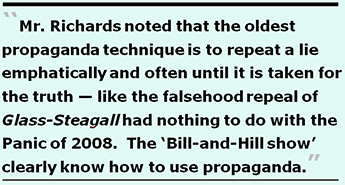 Hillary continues
to oppose re-instating provisions of Glass-Steagall, in
part because she doesn’t want to lose her political contributions
and speaking engagement fees from Wall Street bankers and speculators.
For this reason alone, my recommendation is to cast your vote
for Bernie! Otherwise, it is extremely unlikely that the U.S.
Supreme Court Citizen’s United decision will ever
be overturned, particularly not under a President Hillary.
Hillary continues
to oppose re-instating provisions of Glass-Steagall, in
part because she doesn’t want to lose her political contributions
and speaking engagement fees from Wall Street bankers and speculators.
For this reason alone, my recommendation is to cast your vote
for Bernie! Otherwise, it is extremely unlikely that the U.S.
Supreme Court Citizen’s United decision will ever
be overturned, particularly not under a President Hillary.
Then there’s the problem of stigmatizing people with HIV/AIDS. According to blogger Michael Petrelis, Hillary’s presidential campaign web site claims she believes HIV/AIDS should be de-stigmatized. Her web site’s AIDS page says she will:
While Hillary now claims discrimination shouldn’t be enshrined in our laws, that’s exactly what her hubby, Bill, did.
In 1989, as Governor of Arkansas, Bill Clinton signed into law two of the nation’s toughest HIV transmission criminalization statutes. Since then, Petrelis reports 50 people have been imprisoned in Arkansas for HIV transmission, 29 of whom have been released from prison while the other 21 languish in prison. Nineteen of the 50 received sentences of greater than 20 years, and two (both African American men) received life sentences. Of the 50, 24 were African American, 24 white, one was Hispanic, and one was Native American Indian.
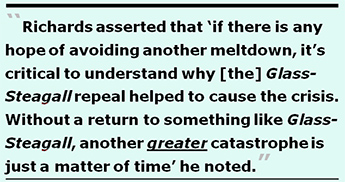 H+illary has done
nothing to date to have these sentences commuted. Petrelis wrote:
H+illary has done
nothing to date to have these sentences commuted. Petrelis wrote:
All of those convicted of HIV transmission in Arkansas deserve a second look at their convictions.
Although Petrelis placed an FOIA request to discover how many HIV positive individuals have been charged with HIV exposure violations since November 1989, Arkansas Attorney General Leslie Rutledge has stupidly refused to respond to the FOIA request, saying Arkansas FOIA law only applies to Arkansas citizens residing within the state, and records will be released only to Arkansas citizens.
 Petrelis has found
an Arkansas citizen to place the same request, so we’ll see
if Ms. Rutledge coughs up the prosecution data during the past
27 years.
Petrelis has found
an Arkansas citizen to place the same request, so we’ll see
if Ms. Rutledge coughs up the prosecution data during the past
27 years.
Prez Hillary and “First Gentleman” Bill? You’re kidding me, right? Give this pair of propaganda specialists more a “matter of time” to engineer another Wall Street disaster? I don’t trust either of them!
I’m casting my vote for Bernie, and you should, too, whether or not hell may be involved.
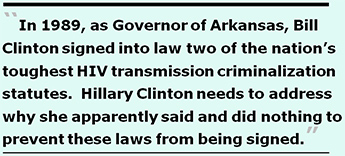 Republican
Presidential Primary
Republican
Presidential Primary
I’d like to offer sympathy to the Republican Party for its field of three pathetic candidates, who all appear to be unqualified to be Commander-in-Chief. Republicans are on their own here, since for the past eight years of the Obama Administration, the Republican Party has devolved into the “Party of No” and has become largely irrelevant. What were they thinking?
 Well, these are my
recommendations. You have a month to figure out how you’ll
vote.
Well, these are my
recommendations. You have a month to figure out how you’ll
vote.
Monette-Shaw is an open-government accountability advocate, a patient advocate, and a member of California’s First Amendment Coalition. He received a James Madison Freedom of Information Award from the Society of Professional Journalists-Northern California Chapter in 2012. He can be contacted at monette-shaw@westsideobserver.